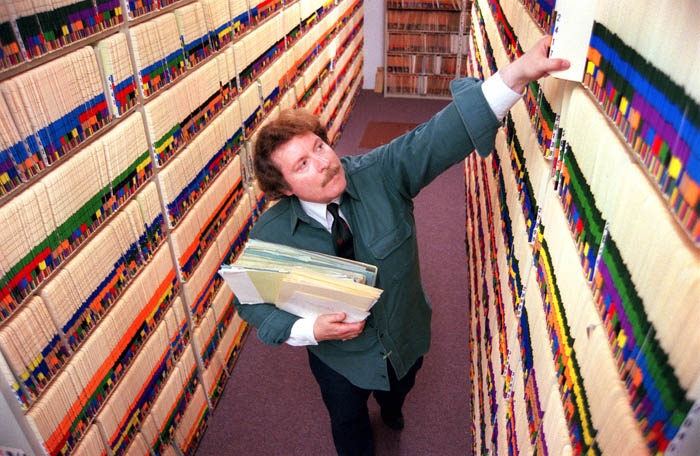It’s a good thing that Herb Adams wears a nylon windbreaker, because with his wavy hair, clipped mustache and orator’s diction we might forget that he is of our time.
The former state legislator, part-time teacher and full-time Maine history nut is extra busy these days, as the nation marks the 150th anniversary of the start of the American Civil War.
Adams, who was just as interested with the 149th and the 131st and the 127th anniversaries has a lot to offer those of us who just tune in for the round-number years, and he can make the events of a century and a half ago, hundreds of miles away seem quite immediate in some surprising ways.
The most surprising? Did you know that the night Confederates fired on Fort Sumter – 150 years ago Tuesday – some Portland residents were taking in a performance of “Hamlet,” starring none-other-than John Wilkes Booth, Abraham Lincoln’s assassin?
Or, in other words, when the first shots of the war rang out, the man who fired one of the war’s last shots was right here in town.
“He had been here about a month, performing ‘Hamlet,’ ‘Macbeth’ and a whole array of other plays including ‘The Corsican Brothers,’ about a pair of twins, in which he played both parts,” Adams said. “He was very well-regarded. He was very young and what he lacked in subtlety he made up for in swashbuckling. It was blood and thunder, and blood and thunder sold back then, just as it does today. Portlanders liked it fine.”
Adams wasn’t there. But you may be excused if you sometimes forget that when he is talking. His study of Portland’s newspapers of the period – the Democratic-leaning Daily Argus and the emergent Republicans’ Portland Advertiser – has put him in contact with plenty of people who were.
“You know, Booth was a great friend, a gallant co-star, very dashing and handsome,” Adams said. “He broke hearts wherever he went, including here.”
Adams says that it can be proven that Booth had an affair with 19-year-old Helen Western, the theater owners’ daughter who played Desdmona to his Othello and Juliet to his Romeo for Portland audiences.
After Booth was hunted down and killed by federal troops following the Lincoln assassination, the contents of his pockets were collected and sent to the National Archives, where they remain today.
“I’ve seen a picture of them,” Adams said. “He carried six pictures of young women in his wallet until the day he died. Some of them are unknown, but I recognized one of them: It was Helen Western of Portland, Maine.”
He wrote about Booth in Portland for a piece in the April 17, 1988, Maine Sunday Telegram, and heard little about it until recently when his work was cited in a new biography of Booth by Nora Titone called “My Thoughts Be Bloody.”
Booth put on his performances in Deering Hall, a long-gone theater on the corner of Congress and Preble streets, where the Portland Public Library now stands. It looked out on what was then called “Market Square” (no Civil War yet, so no monument.)
It was the brand-new northern terminus of a telegraph link to New Orleans (what Adams calls the “Victorian Internet”) which brought news of Fort Sumter to Portland, and sparked a massive pro-Union rally in the square.
The crowd joined in “a great eagle scream for war” according to a newspaper account, so a disgusted Booth, a Confederate sympathizer, skipped town, leaving Helen and an unpaid printing bill with the Advertiser.
“Our experience with him shows he lacks the requisites of a gentleman,” a blistering editorial read. “He was extremely liberal in his offers and not sparing of promises to cut the story short, we have not seen the color of the gentleman’s money.”
Not much survives of the city Booth would have seen, Adams said. Most of Portland’s “old” buildings in the Old Port were put up in the late 1860s, after the Great Fire. The First Parish Church on Congress Street hasn’t changed much. He might have seen Fort Gorges in Portland Harbor, which was then under construction.
But anniversaries like this one make that past much less remote, Adams said.
“It shows how swift is the passage of time and reminds us of our own mortality. It also show us how young our country really is.”
He explained:
“Yes, the Civil War was long ago, yet it is very much alive and still echos today. When I was a boy, my baby sitter was a woman whose father was in the Civil War. She would hold my hands and tell me the stories, just as he would hold her hands when she was a girl. And that’s where we are, just a few stories away from the actual event.
“I heard it from those who heard it from those who were there.”
Greg Kesich is an editorial writer. He can be contacted at 791-6481, or: gkesich@pressherald.com
Send questions/comments to the editors.




Success. Please wait for the page to reload. If the page does not reload within 5 seconds, please refresh the page.
Enter your email and password to access comments.
Hi, to comment on stories you must . This profile is in addition to your subscription and website login.
Already have a commenting profile? .
Invalid username/password.
Please check your email to confirm and complete your registration.
Only subscribers are eligible to post comments. Please subscribe or login first for digital access. Here’s why.
Use the form below to reset your password. When you've submitted your account email, we will send an email with a reset code.